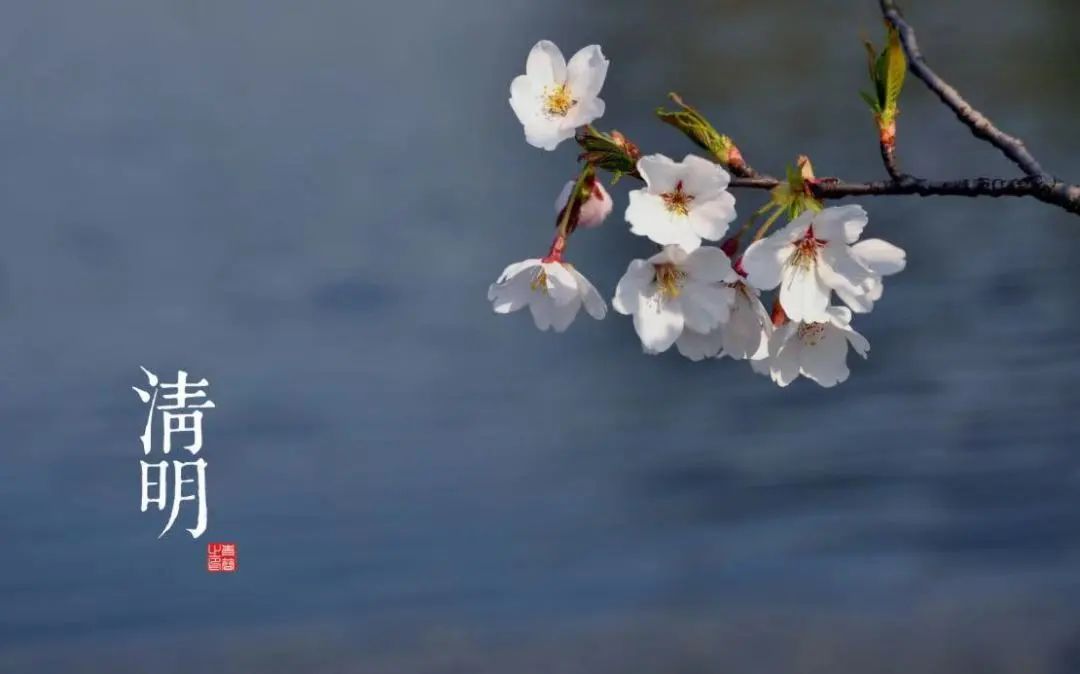
清明节,又称踏青节、行清节、三月节、祭祖节等,节期在仲春与暮春之交。清明节源自早期人类的祖先信仰与春祭礼俗,是中华民族最隆重盛大的祭祖大节。清明节兼具自然与人文两大内涵,既是自然节气点,也是传统节日,扫墓祭祖与踏青郊游是清明节的两大礼俗主题,这两大传统礼俗主题在中国自古传承,至今不辍。
Qingming Festival, also known as Tomb Sweeping Day, Ancestors' Day, or Pure Brightness Festival, falls between early and late spring. The festival originated from the early human ancestor worship and spring sacrificial customs, and is the most solemn and grand ancestor worship festival of the Chinese nation. Qingming Festival has both natural and cultural significance, serving as both a traditional holiday and a natural solar term. The two main customs of Qingming Festival are tomb sweeping and outing, which have been passed down since ancient times in China and continue to this day.

The origin of Qingming Festival
中国汉族传统的清明节大约始于周代,距今已有二千五百多年的历史。清明最早只是一种节气的名称,其变成纪念祖先的节日与寒食节的融入有关。相传春秋时期晋文公为纪念死于火中的忠臣介子推而将其忌日命为寒食节,其后一天定为“清明节”。古时,寒食亦称“禁烟节”“冷节”,在夏历冬至后一百零五日,清明节前一日,是缅怀和感恩为主题的祭扫节日。清明是踏青春游的日子。扫墓从唐朝开始盛行,唐朝扫墓日期一般在寒食节,唐玄宗诏令“寒食上墓”。因寒食与清明相接,随着时间的迁移,寒食节的习俗渐渐融入了清明节。到了宋元时期,清明逐步形成一个以祭祖扫墓为中心,将寒食风俗与踏青等活动相融合的传统节日。人们由于清明上坟都要到郊外去,在哀悼祖先之余,顺便在明媚的春光里骋足青青原野。因此,清明节也被人们称作踏青节。
The traditional Qingming Festival of the Han ethnic group in China dates back to the Zhou Dynasty, over 2,500 years ago. Originally, Qingming was simply the name of a solar term, but it became associated with the festival for commemorating ancestors since merged with the Cold Food Festival. According to legend, during the Spring and Autumn Period, Duke Wen of Jin designated the day of mourning for his loyal minister Jie Zitui, who died in a fire, as the Cold Food Festival, with the next day being called Qingming Festival. In ancient times, the Cold Food Festival was also known as the No Smoking Festival or Cold Festival and was a day of remembrance and gratitude for ancestors, celebrated on the day before Qingming, 105 days after the winter solstice in the lunar calendar. Qingming is a day for spring outings and tomb-sweeping. Tomb-sweeping became popular during the Tang Dynasty, with the custom of sweeping tombs usually falling on the Cold Food Festival, as Emperor Xuanzong of Tang decreed to sweep tombs during the Cold Food Festival. As the Cold Food Festival was close to Qingming, the customs gradually merged into the Qingming Festival. By the Song and Yuan Dynasties, Qingming had become a traditional festival centered around ancestor worship and tomb-sweeping, combining the Cold Food customs with outings and other activities. During Qingming, people visit the tombs of their ancestors in the outskirts of the city, mourning and showing respect to their ancestors, while also enjoying the beautiful spring scenery. Therefore, Qingming Festival is also known as the Spring Outing Day.
清明节的习俗
The Customs of Qingming Festival
清明节习俗是指在清明节前后进行的祭奠先人的习惯风俗。据传始于古代帝王将相“墓祭”之礼,后来民间亦相仿效,在当天祭祖扫墓,历代沿袭而成为中华民族一种固定的风俗。清明节习俗具体有:
The customs of Qingming Festival refer to the traditional practices of honoring ancestors before and after the Qingming Festival. It is said to have originated from the ancient imperial court's tomb-sweeping ceremony, which was later imitated by the common people. On that day, people offer sacrifices to their ancestors and sweep their graves, which has become a fixed tradition of the Chinese nation over the generations. The specific customs of Qingming Festival include:
清明祭扫坟茔是和丧葬礼俗有关的节俗。清明节是我国最大的祭祖和扫墓的日子,我国大部分地区都是在清明节扫墓。
The custom of paying respect to the deceased ancestors during Qingming Festival is closely related to funeral customs. Qingming Festival is the largest day for ancestor worship and grave sweeping in China. Most regions in China sweep graves during Qingming Festival.
踏青又叫春游、探春、寻春。汉族节日习俗,清明时节,于花草返青的春季,结伴到郊外原野远足踏青。三月清明,春回大地,自然界到处呈现一派生机勃勃的景象,正是郊游的大好时光。我国民间长期保持着清明踏青的习惯。
Spring outing, also known as spring excursion, spring exploration, or spring seeking, is a Han Chinese festival custom. During the Qingming season, when the flowers and grass turn green in spring, people go on outings and picnics in the countryside. With the arrival of spring in March and Qingming Festival, there is a lively atmosphere in nature, making it a perfect time for outings. The Chinese people have long maintained the tradition of spring outings during Qingming Festival.
自古就有清明节禁火的风俗习惯,清明寒食禁烟火,原本是为了纪念介子推。清明前一天为寒食节,古代寒食禁火只许吃冷食。
There has been a custom of banning fires during Qingming Festival since ancient times. Cold food and no smoking are the rules on the day of Qingming Festival. The day before Qingming Festival is known as Cold Food Festival. In ancient times, fire was prohibited and only cold food was allowed during the Cold Food Festival.
蹴鞠,就是用足去踢球。清明习俗蹴鞠,鞠是一种皮球,球皮用皮革做成,球内用毛塞紧。蹴鞠是古代清明节时人们喜爱的一种游戏。
Cuju is a game played by kicking a ball with the feet. The ball was made of leather and stuffed with wool. And it was a popular game during ancient Qingming Festival.
打马球也是端午传统游戏之一。马球,是骑在马上,持棍打球,古代称为击鞠。
Polo is also a game played during the Dragon Boat Festival. It involves riding on a horse and hitting a ball with a stick, which was called jiju in ancient times.
插柳也是清明节的一项传统活动,人们会在清明节期间去采摘嫩柳枝,并将其插在门前或者窗户上,以示生机勃勃、欣欣向荣的意思。
Planting willows is another traditional activity during Qingming Festival. People go to pick young willow branches during Qingming Festival and insert them in front of their doors or windows to symbolize vitality and prosperity.
荡秋千是清明节的另一项传统体育活动,人们会在树枝上悬挂秋千,荡来荡去,增强身体的锻炼。
Swinging is another traditional physical activity during Qingming Festival. People hang swings on tree branches and swing back and forth, which helps to strengthen the body.
这些传统习俗和活动不仅丰富了人们的生活,也反映了中华民族的文化底蕴和民间风情。
These traditional customs and activities not only enrich people's lives but also reflect the cultural heritage and folk customs of the Chinese nation.
清明节吃什么
What to eat in Qingming Festival
“燕子来时新社,梨花落后清明。”清明节气,乃天清地明之意。此时,气候温暖、桃花初绽、杨柳泛青,有很多时令美食在这个春暖花开的季节上市,因此古代清明节还是一个美食节,让我们一起来看看清明节有那些限定美食吧。
清明时节,江南一带有吃青团子的风俗习惯。青团子是用一种名叫“浆麦草”的野生植物捣烂后挤压出汁,接着取用这种汁同晾干后的水磨纯糯米粉拌匀揉和,然后开始制作团子。团子的馅心是用细腻的糖豆沙制成,在包馅时,另放入一小块糖猪油。团坯制好后,将它们入笼蒸熟,出笼时用毛刷将熟菜油均匀地刷在团子的表面,这便大功告成了。
我国南北各地清明节有吃馓子的食俗。“馓子”为一油炸食品,香脆精美,古时叫“寒具”。寒食节禁火寒食的风俗在我国大部分地区已不流行,但与这个节日有关的馓子却深受世人的喜爱。现在流行于汉族地区的馓子有南北方的差异:北方馓子大方洒脱,以麦面为主料;南方馓子精巧细致,多以米面为主料。
There is a custom of eating Sǎnzi during the Qingming Festival in various regions of China. Sǎnzi is a fried food that is crispy and exquisite, and was called Hánjù in ancient times. The custom of prohibiting fire and cold food during the Cold Food Festival is no longer popular in most parts of China, but Sǎnzi related to this festival is deeply loved by people. Sǎnzi that is now popular in the Han areas has differences between the north and south: Northern Sǎnzi is generous and free-spirited, with wheat flour as the main ingredient, while Southern Sǎnzi is exquisite and meticulous, with rice flour as the main ingredient.
清明时节,闽东各地无论城乡,大多有吃芥菜的食俗。据说每年二月二吃了用芥菜和大米混煮的“芥菜饭”可以终年不长疥疮。
During the Qingming season, in most urban and rural areas of eastern Fujian, there is a custom of eating leaf mustard. It is said that eating leaf mustard rice made with leaf mustard and rice on the second day of the second lunar month can prevent one from getting skin disease throughout the year.
在这个特别的节气,古代诗人们也创作了不少优美的诗句,下面让我们一起来欣赏吧。
In this special season, ancient poets also created many beautiful verses. Let's appreciate them together below.
《清明》
(唐)杜牧
清明时节雨纷纷,
路上行人欲断魂。
借问酒家何处有?
牧童遥指杏花村。
The Mourning Day
Du Mu(Tang Dynasty)
A drizzling rain falls
like tears on the Mourning Day;
The mourner’s heart is going
to break on the way.
Where can a wine-shop be found
to drown his sad hours?
A cowherd points to
a cot amid apricot flowers.
《浣溪沙》
(宋)李清照
淡荡春光寒食天,
玉炉沉水袅残烟。
梦回山枕隐花钿。
海燕未来人斗草,
江梅已过柳生绵。
黄昏疏雨湿秋千。
Silk - Washing Stream
Li Qingzhao(Song Dynasty)
Spring sheds a mild and wild light
on Cold Food Day;
Jade burner spreads the dying incense
like a spray.
Walking, I find my hairpin
under pillow stray.
The swallows not yet come,
a game of grass we play;
Willow down wafts
while mume blossoms fade away.
In drizzling rain at dusk
the garden swing won't sway.
《寒食》
(唐)韩翃
春城无处不飞花,
寒食东风御柳斜。
日暮汉宫传蜡烛,
轻烟散入五侯家。
Cold Food Festival
Han Hong(Tang Dynasty)
All over the Capital catkins flew wantonly,
A scene of the spring so significant.
On Cold Food the east wind willfully.
Made the imperial willows slant.
Now as the dusk approached quietly
Within the Han palace candles glowed,
Towards the five mansions of nobility
The silvery smoke of the tapers flowed.
翻译 / ABDUL FAVAD DZHAN

微信扫一扫
关注该公众号





